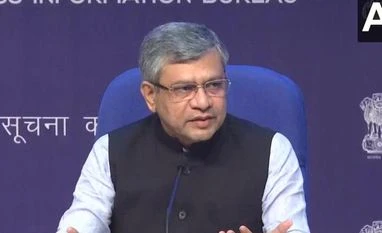5G services will bring fundamental change in several sectors: Vaishnaw
The next generation high-speed 5G services will bring fundamental changes across several sectors, including education, health, agriculture and banking, Telecom Minister Ashwini Vaishnaw said
)
Ashwini Vaishnaw
The next generation high-speed 5G services will bring fundamental changes across several sectors, including education, health, agriculture and banking, Telecom Minister Ashwini Vaishnaw said on Saturday.
The minister also said that 5G will create new services with digital capabilities at the centre.
"Telecom is a gateway of Digital India. Telecom is the root of all digital services that we are seeing in our modern life. 5G services will bring fundamental change in several sectors - education, health, agriculture, logistics, and banking. It will create new opportunities," Vaishnaw noted.
The 5G service was launched by Prime Minister Narendra Modi at India Mobile Congress on Saturday.
The minister said the Prime Minister gave a challenge of developing indigenous technology for 4G and 5G, and India is marching ahead in the technology development, and now the world is looking at Indian telecom technology.
Also Read
Modi launched a crucial 5G network gear -- 5G Non-Standalone (NSA) core, indigenously designed and developed by state-run C-DOT.
Centre for Development of Telematics (C-DOT) said that end-to-end 5G call was demonstrated using C-DOT 5G NSA Core installed at BSNL Chandigarh and 5G Radio Access Network (RAN), developed in collaboration with Wisig Networks, VVDN Technologies and Radisys India.
The industry lauded the government's move to launch 5G services in the country, terming it a transformation step for industrial development.
"It is a generational leap that can help increase the telecom sector's contribution to GDP to 8-9 per cent from 6.5 per cent presently," Ficci Director General Arun Chawla said.
Ficci IT/ITeS Committee chairperson Rahul Sharma said it is anticipated that 5G technology will add USD 450 billion to the Indian economy between 2023 and 2040.
"The potential of 5G in India is genuinely transformative. Once built, it will accommodate up to one million connected devices per square kilometre compared with only 2,000 under 4G," Chawla said.
Nokia Senior Vice President and Head of India market Sanjay Malik said its global experience in 5G rollouts shows that it will provide a strong impetus to socio-economic growth and industrial development, contributing to the GDP and mission of Digital Bharat.
MediaTek India Managing Director Anku Jain said 5G will usher in a new wave of opportunities for businesses, unlocking the next level of growth for the country.
"5G will be a key driver for Digital India initiatives and realising Design in India opportunities, leveraging disruptive technologies like AI, cloud, IoT, and others across the ecosystem. We foresee India becoming a major hub for cutting-edge semi-conductor R&D and design, and the rollout of 5G services will accelerate the next wave of digital transformation," Jain said.
Telecom Sector Skill Council CEO Arvind Bali said in FY202122, around over 36,000 competent workers were needed in India for 5G and allied technologies.
"Due to the increased use of internet services and apps, the demand for better telecom networks, and currently the implementation of 5G network, this gap will only widen. To close this gap, we have also teamed up with various government, academic, and business stakeholders. India is home to a sizable talent pool, hence it is crucial that the youth is skilled, upskilled, or reskilled for this new network technology," Bali added.
IT company Comviva CEO Manoranjan Mohapatra said the rollout of the 5G network in India will be a crucial enabler for digital transformation.
"The global market for 5G-enabled business applications is expected to grow to USD 20 billion over the five years and India will be a critical contributor to this expansion. 5G will not only improve connectivity across the country but also reinvent the customer experience for telco consumers apart from the traditional calling and internet services," Mohapatra said.
Tech Mahindra President for Communications, Media and Entertainment Business, and CEO, Network Services, Manish Vyas said 5G is not just a generational leap in Network technology, it is a platform for innovation.
"I often say that 5G is like the last piece of the Industry 4.0 jigsaw puzzle, that will spearhead the next wave of digital disruption, taking us a step closer to realising our dream of Aatmanirbhar Bharat and technological supremacy," he noted.
GIS (geographic information system) technology services firm Esri India managing director Agendra Kumar said the advent of 5G will not only revolutionise the Indian telecom industry but will have a huge social, economic and global impact.
"In all this, GIS technology and geospatial infrastructure will play a pivotal role in helping Telecom Service Providers (TSPs) in designing and managing their networks, assets, and operations in an integrated way, and be agile enough to grow as their business requirements change," he said.
Cyber security intelligence firm CloudSEK CEO Rahul Sasi that 5G technology architecture is fundamentally more secure than its predecessors.
"5G architecture is built on top of API, the same technology stack that powers the web. This means the future of telecom security would be in the hands of web hackers. Low-skilled web hackers might be able to read a voice message if a 5G network is not implemented correctly," he said.
(Only the headline and picture of this report may have been reworked by the Business Standard staff; the rest of the content is auto-generated from a syndicated feed.)
More From This Section
Don't miss the most important news and views of the day. Get them on our Telegram channel
First Published: Oct 01 2022 | 11:46 PM IST
